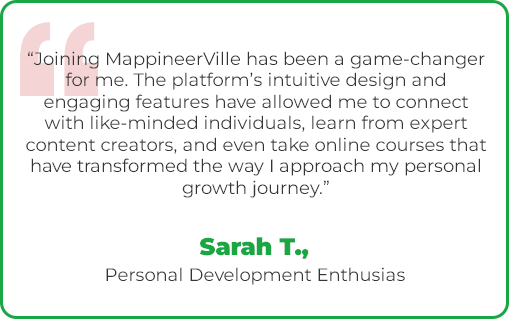


- What does "success" mean to you, and how does it align with your current goals for change?
- If fear were not a factor, what bold steps would you take towards transforming your life?
- What habits or patterns from your past do you think may be influencing your current situation, and how can you break free from them?
- In what ways do you believe your mindset contributes to or hinders your ability to make positive changes?
- What self-limiting beliefs do you think might be holding you back, and how can you challenge or reframe them?
- What strengths or talents do you possess that you may not be fully utilizing, and how can they contribute to your journey of improvement?
Not knowing who you are can present various challenges that can impact your overall well-being and sense of fulfillment. Some of these challenges include:
- Lack of Purpose:
Without self-actualization, individuals may struggle to define and pursue a clear sense of purpose, leading to a feeling of aimlessness or unfulfilled potential.
- Stagnation in Career and Personal Development:
Without a drive for self-actualization, individuals may remain stagnant in their careers and personal development, missing out on opportunities for advancement and fulfillment.
- Limited Personal Growth:
The absence of self-actualization may result in a lack of continuous personal growth, preventing individuals from maximizing their intellectual, emotional, and creative capacities.
- Sense of Inauthenticity:
Not being true to oneself and living in alignment with personal values can lead to a sense of inauthenticity, creating internal conflict and dissatisfaction.
- Low Self-Esteem and Confidence:
Failing to realize one’s potential can contribute to feelings of low self-esteem and confidence, as individuals may not fully recognize or appreciate their abilities and accomplishments.
- Difficulty Making Decisions:
Lack of self-awareness and clear values can make decision-making more challenging, leading to indecision, hesitancy, or choices that don’t align with one’s true desires.
- Unfulfilled Aspirations:
Individuals may find themselves constantly yearning for a deeper sense of meaning and accomplishment, feeling unfulfilled due to unrealized aspirations and goals.
- Emotional Turmoil:
Unexplored emotions and unresolved issues may contribute to emotional turmoil, creating a constant undercurrent of stress, anxiety, or unhappiness.
- Difficulty Navigating Life's Challenges:
The lack of self-actualization can make it challenging to navigate and overcome life’s obstacles, as individuals may lack the resilience and clarity that self-awareness and personal growth bring.
- Limited Impact on Others:
Without self-actualization, individuals may struggle to positively impact those around them, missing opportunities to contribute meaningfully to their communities or the broader world.
- Strained Relationships:
Personal growth and self-awareness are often linked to improved interpersonal skills. Without self-actualization, relationships may suffer from communication challenges, a lack of empathy, or difficulty connecting with others authentically.
- Feelings of Regret:
Not living up to one’s potential may lead to feelings of regret later in life, as individuals reflect on unfulfilled dreams and missed opportunities.
- Unhealthy Coping Mechanisms:
Individuals who are not self-actualized may resort to unhealthy coping mechanisms such as avoidance, denial, or self-destructive behaviors to deal with the dissatisfaction and frustration they may feel.
- Difficulty Establishing Boundaries:
A lack of self-actualization can result in challenges in setting and maintaining healthy boundaries, potentially leading to issues in relationships and personal well-being.
- Reduced Resilience:
The absence of self-actualization can hinder an individual’s ability to bounce back from setbacks, limiting resilience in the face of challenges and adversity.
Recognizing these challenges can be a crucial step towards developing your personal growth and working towards self-actualization. Seeking support, engaging in self-reflection, and setting meaningful goals are essential components of overcoming these challenges.
That is precisely why I created the
I AM Self-actualization Mappineering System.
To Help You, I have created the following:
- I AM Mini Course: 1 hour long course designed to help you mappineer the foundation of your own I AM Mind Map.
- I AM Level One Course: 4 week course designed to….
- I AM Level Two Course: 4 Week course, taken after I AM Level One, designed to …..
- I AM Level Three Course: 4 Week course, taken after I AM Level Two, designed to….
What you will experience after the course:
Self-actualization is a concept introduced by Abraham Maslow, referring to the realization and fulfillment of one's talents, potential, and capabilities. It is often described as the highest level of psychological development. While the experience of self-actualization can be unique to each individual, there are several common elements and potential outcomes associated with this state:
- Increased Self-Awareness:
- Continuous Learning:
- Clarity of Purpose:
- Altruism and Compassion:
- Authenticity:
- Emotional Fulfillment:
- Emotional Resilience:
- Intrinsic Motivation:
- Creative Expression:
- Living in the Present Moment:
- Heightened Perception:
- Peak Experiences:
- Autonomy and Independence:
- Transcendence:
- Meaningful Relationships:


